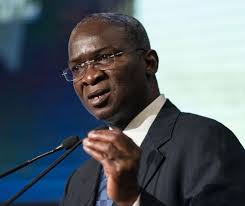By Modestus Umenzekwe
The former Executive Governor of Lagos State and two times Honourable Minister of the Federal Republic of Nigeria, having superintended over the Ministry of Power, Works and Housing and finally the Ministry of Works and Housing, Babatunde Raji Fashola, SAN, CON, is a man who has carved a niche for himself, not just as a social thinker but also as a reformer.
His contributions in state and national development as Governor of Lagos State between 2007 and 2015 can be appreciated by x-raying his progressive transformation of Lagos following the well-tailored master-plan left behind by his predecessor, Asiwaju Bola Ahmed Tinubu who is now the President of Nigeria. Roads built under his supervision remain a reference point till date because he ensured they were constructed according to specifications and beautiful designs. Fashola made sure that every road build or rehabilitated under his administration was installed with street lights, indiscriminate packing of vehicles attracted huge fine hence gridlock was drastically minimized. He conceptualized most roads and rail projects and commenced serious work on the Eko Atlantic City project.
Eko Atlantic City, a visionary project in Lagos Nigeria located adjacent to Victoria Island and Lekki – that will measure a total of 10 million square metres of reclaimed land when fully completed and currently at 6,520,000 m² of land; and has rapidly transformed the coastline into a world-class destination that showcases the true potential of urban development.
In 2005, the then Lagos State Governor, Bola Ahmed Tinubu, in a letter addressed to President Olusegun Obasanjo and titled ‘Permanent Solution to the Bar Beach’ sought the latter’s approval for the reclamation of the coastal land on behalf of a private investor that would convert the liability to an asset that would benefit Lagos State and the Nigerian people at large. That same year, President Olusegun Obasanjo gave an approval for the commencement of the project. In 2008, the construction of the new city began, that was Fashola’s Administration which some have described as the Golden era of Lagos State.
The beautification of Lagos took a new turn under his regime and lit-up Lagos making Lagos a place where night life was not only enhanced but security was also made topnotch.
As the Minister of Power, Works and Housing, Fashola did not only distinguish himself as a visionary leader, he made a mark as a national and detribalized leader. He made sure that the six geopolitical zones of the country felt the presence of his architectural signature road and housing projects which include the 2nd Niger Bridge, electricity was not left out.
As a social thinker and reformer, since leaving office he has continued to engage in his usual trademark of nation building as he delivers high profile lectures, the latest being the Eko Club 50th Anniversary Celebration Lecture which has the theme, “The Role of Social Clubs in Social Engineering,” at the Eko Club, Bode Thomas, Surulere, Lagos State, on Wednesday, 11th September, 2024.
As a man who believes in the future, he said, while the club remains very proud of its historic past, they must focus sharply on the future because the blessings and opportunities that lie ahead for the Eko Club family in the next 50 years far exceed anything they have experienced in the last 50 years.
While stating that the Eko Club under the distinguished leadership of President Razak Olugbenga Amodu, has contributed to the building of a brand that has endured for five decades, transcending the shores of Nigeria, Fashola defined Social club as “a group of people or the place where they meet, generally formed around a common interest.” He maintained that even though Eko Club is a socio-cultural organization aimed at protecting and promoting the interests of its members in all spheres of life… “without being politically partisan,” as it seeks to Foster and promote fellowship and brotherhood among members; Support all proper and lawful actions in the interest and welfare of members; Promote and organize social, cultural, educational, sporting, and other activities and cooperation between the club and other similar organizations; Promote and protect the interest and welfare of indigenes of Lagos State in the social and economic development of the state; among other laudable objectives.
He was of the opinion that even though the club shares a common interest in the well-being of their families, community, safety and security, and their quality of life, especially how the economy impacts them in terms of employment, income, cost of living, healthcare, education, and similar issues, they are also concerned about how the government, in a representative democracy, ensures that those common interests in these things are preserved, protected, and promoted.
Reeling out some of the roles of the club he said, “Eko Club encouraged its members’ children to take up sports, turning them away from gangs and drugs. It encouraged them to accept responsibility by getting married and starting families. Eko Club also interacted with the government to understand and discuss policy.
“All of these are acts of, or in aid of, social engineering, defined by Merriam-Webster as “…the use of centralized planning in an attempt to manage social change and regulate the future development and behaviour of a society…”
“Therefore, in a representative democracy, a social club like Eko Club has a very topical role to play in the social engineering or re-engineering of Nigeria. In matters relating to our interest in the welfare of the people of Lagos State and the development of Lagos State, matters such as how to live in peaceful harmony with those who have settled amongst us should interest us. Matters relating to global developments like climate change, flooding, and artificial intelligence and their impact on us over the next 50 years must interest us, and spur us to play a role.
“The emerging opioid and drug abuse challenges that we grapple with privately as individuals and families, security issues, and economic challenges must define roles for Eko Club over the next 50 years if she must stay true to the aims and objectives of her constitution. After all, if the interest and welfare of indigenes concern us, the interest of one is the interest of all,” Fashola stated.
Setting agenda for the club to which he also belongs, he added “Some of the programmes and events undertaken by the club at seasonal and festive occasions already provide platforms for playing this role across different demographics, religions, and age groups within the club.
I propose, therefore, the consideration of periodic town halls, stakeholder forums, ranging from 60 to 90 minutes speeches, panel discussions, question-and-answer sessions, business luncheons, and dinners inviting persons of know-how and persons of interest.
“These can happen monthly, quarterly, half-yearly, and yearly as the status of the guest demands; and they do not hamper the social ethos of the club. From councillors, local government chairmen, House of Assembly members, state commissioners, permanent secretaries and directors, House of Representatives members, senators, to governors, ministers, and other federal appointees, commissioners of police, and our local division police officers, we can interact more to learn what public office holders are doing about our lives and what we can do to enable them,” he said.
Drawing from his huge experience as a social reformer, Fashola spoke on the vast opportunities that lie in sports, urging Eko Club to go back to its sporting aims and objectives and play a leading role in the revival of youth inter-club competitions. Adding “We cannot leave the success of our athletes at international sports events to only what Government does. It is my humble view that we have been a little too removed from matters that affect our common interests. If you will pardon me for saying so, Eko Club is too big, too prestigious to be recognized merely as a venue for parties, anniversaries, and weddings, important as these may be to the social engineering purpose.”
To ably play the social engineering role of developing society for the future, he said the club must pay attention to the quality of its membership. “I suggest that the club must be more deliberate and intentional in the quality and process of membership recruitment. This process will determine the extent to which the club can fulfill the role envisioned by the founders, as documented in the constitution.
Fashola reminisced that from the politics of social segregation to the agitation for the end of colonialism and independence to the campaign for Nigerian manpower into the public and private sectors resulting in policies such as indigenization, social clubs and their members have been the champions of these causes because they represent matters of dominant common interest.”
He disclosed that Eko Club, and indeed other social clubs, used to be the places where government policies were first hinted at, discussed, or debated before they were made public.
He said, “When I served as the Governor of Lagos State, I took a cue from this tradition by consistently using social clubs as platforms to test and disseminate new policies. One notable example, as mentioned earlier, was the introduction of the Lagos State Road Traffic Law in 2012, which aimed to improve road safety and traffic management in the state. By engaging with social clubs, starting with Eko Club, we were able to gather valuable feedback and build public support before implementing the law and other policies. This approach ensured that our policies were well-received and effectively integrated into the fabric of society.”
He also used the moment to again thank Eko Club for accepting to host a stakeholders meeting to discuss the law passed by the Lagos State House of Assembly to restrict the movement of motorcyclists on certain classes of roads in the state. He said, “The interaction helped the government provide explanations and clarifications on things that were not understood. This understanding converted members and stakeholders into advocates for the policy. Let me point out that other social clubs eventually followed the lead of Eko Club on this matter, and the rest is now history. Communication between government and the governed improved, and the community and state were better served.”



